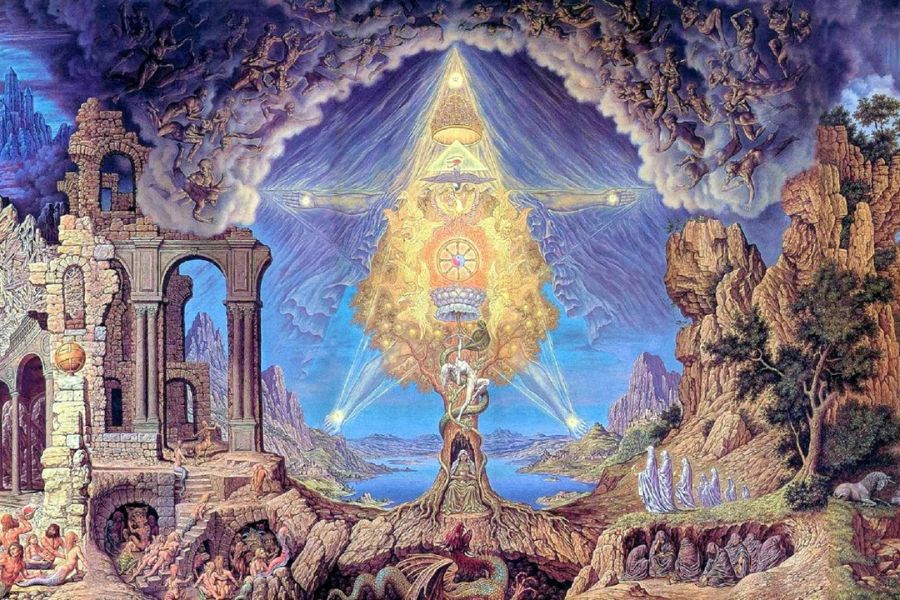Jiddu Krishnamurti, throughout his life, emphasized the importance of deep questioning regarding the conditioning that shapes our perception and understanding of the world.
For him, the problems we face, whether personal, political, economic, or social, should never be approached superficially or through the lens of ideologies, be they religious or political. Conditional thinking, born from our beliefs and dogmas, generates confusion and perpetuates conflict rather than resolving it. According to Krishnamurti, true freedom and understanding begin when the mind is freed from the shackles of the past.
When we talk about addressing problems with a pre-defined model of action, like a political or religious ideal, Krishnamurti warns about the dangers of conditioning. Organized religion, for instance, often hinders true understanding because the mind, clinging to dogmas and beliefs, loses the ability to see things as they truly are. The challenge he proposes is how we can understand a problem directly, without the influence of prior conditioning, and thus be able to put an end to conflict—not temporarily, but permanently.
The first step, according to Krishnamurti, is to realize that each problem is new. Whether political, economic, social, or personal, life is in constant flux. Our natural tendency is to approach problems with past experiences and automatic responses from thought, which are based on what we already know. However, by doing so, we’re not truly facing the new problem but responding to the past. This is a form of self-deception, because by applying old solutions to new problems, we only prolong suffering.
Krishnamurti invites us to reflect on the difficulty we have in facing the new. Often, we seek comfort in what we already know and the answers handed down by our traditions, culture, religion, and beliefs. Yet, he reminds us that true understanding arises when we are able to look at the present without the filter of past beliefs. The challenge is not to find easy or quick solutions, but to perceive life as it is, in its constant transformation.
For Krishnamurti, the key to solving any problem is understanding ourselves. Human thought is conditioned by a variety of influences, both internal and external, that shape our worldview and reactions. The mind, a product of our past experiences, tends to seek security in the answers of the past. But life, by nature, is dynamic and does not easily adapt to pre-existing solutions.
Thus, Krishnamurti proposes that in order to understand the challenges we face in life, we must look deeply within ourselves and understand how our conditioning affects the way we relate to the world and to others. Self-knowledge, he asserts, is the starting point for wisdom. But this self-knowledge cannot be found in books or doctrines; it arises from the direct observation of our own minds, free from judgments and interpretations.
Krishnamurti believed that the greatest human challenge lies in our relationships with others. From the moment we fail to understand ourselves, we are incapable of relating in a truthful, conflict-free manner. The truth about ourselves and the world cannot be found in the relentless search for answers, but in the clear, unclouded understanding of our own being.
Living is about relating, and all the conflicts we encounter—whether in personal relationships or in the political and social spheres—stem from our inability to deal with the truth of what we are. When we relate to others from preconceived ideas, expectations, and fear, we create more separation and conflict. This is why Krishnamurti asserts that, rather than isolating ourselves or withdrawing from the world in search of tranquility, we must understand the entirety of our own conditioning, especially in the context of our interactions with others.
For Krishnamurti, truth is not something that can be sought or attained. It cannot be found through the accumulation of knowledge or adherence to ideologies. Truth reveals itself naturally when the mind is free from prejudices, attachments, and the conditioning of the past. When we are able to look at the world with a fresh mind, free from the limitations of habitual thought, truth emerges.
True freedom, then, is not freedom to follow our own will or desires, but freedom to perceive life as it is, without the interference of past conditioning and beliefs. Only when the mind is tranquil and free can a human being live fully, without the anxiety of tomorrow or the burden of yesterday.
In summary, what Krishnamurti proposes is not a theory or philosophy but an invitation to the daily practice of self-knowledge and sincere observation of our own mental processes. The true solution to human conflicts does not lie in finding external answers, but in transforming our own minds and, thus, creating a new world, free from violence, confusion, and suffering.




















